This post was originally published as a press release on 28 November 2016.
 On Saturday (26 November), over 60 members voted in an Extraordinary General Meeting (EGM) held at the AWARE Centre to amend the AWARE Constitution, as part of an overall update of the Constitution.
On Saturday (26 November), over 60 members voted in an Extraordinary General Meeting (EGM) held at the AWARE Centre to amend the AWARE Constitution, as part of an overall update of the Constitution.
As a result of the EGM, resolutions for the following amendments were passed:
- Membership categories: These were renamed and updated. The changes clarified that, for the purpose of deciding membership rights, “women” includes transgender women and “men” includes transgender men. They also made provision for people who do not identify as men or women (non-binary people) to join as Associate Members – they were previously unable to join because members had to specify if they were “male” or “female”.
- Voting rights: Associate Members (men and non-binary people) were given the right to vote in General Meetings at AWARE, subject to a cap so that their votes cannot count for more than 25% of the votes on a resolution. Previously, Male Associate Members had no voting rights. 71.8% of the voting members present voted in favour of this change.
- Objectives, Values and Functions of AWARE: These were updated and clarified to make them clearer and easier to understand (see below Annex for the new language).
- Other technical changes to rationalise membership, meeting and other mechanisms.
The following changes were proposed but the resolutions for them were not passed:
- Name: Change the name of the organisation from “Association of Women for Action and Research” to “AWARE”.
- Associate Members on the Board: Grant Associate Members limited rights to take up non-office-holder roles on the Board. 58% of the voting members present voted in favour of this change, but AWARE’s Constitution requires a two-thirds majority of the voting members present to effect any changes.
The day began with a Members’ Forum at 10am. Thorough and impassioned discussion of varying views took place through an initial plenary ‘Fishbowl’ session (with all participants watching a small group in the middle) and small group discussions followed by a second plenary. The EGM then began at 1.30pm and ended at around 5pm.
The amendments relating to membership were proposed following an extended period of consultation and research by a committee appointed by the Board in 2014, in response to queries from members at Annual General Meetings. The committee carried out focus group discussions, administered an online survey of members and conducted interviews by phone and email. The findings from this consultation exercise were disseminated to all members and discussed at the April 2016 Annual General Meeting. At the EGM on Saturday, the written statements of numerous members and some volunteers were circulated to all attendees.
Male Associate Members are currently 7% of AWARE’s total membership. General meetings of AWARE have previously discussed and voted on the issue of voting rights for male members in 2006 and 2008. The changes were intensely debated and strongly contested throughout the consultation process and on the day’s Forum and EGM themselves.
Proponents for the extension of voting rights and Board roles for men stated a belief that men who subscribe to feminist values should not be completely barred from these forms of involvement on the grounds of gender. They argued that the changes would enable AWARE to better reach out to men to effect social change, and set the stage for capacity-building supportive men to better carry out AWARE’s mission.
Opponents to the extension of voting rights and Board roles for men expressed concern that these changes would come at the expense of women’s voices and space for women’s leadership. They were particularly concerned about the potential negative impact for women who face multiple forms of discrimination, such as discrimination based on race, disability or socio-economic class. They noted that men can already participate in AWARE’s activities – and in many cases, have already done so – without voting rights or Board positions.
“AWARE’s work is multifaceted,” said Teh Hooi Ling, AWARE President. “We work to improve the lives of marginalised groups and the policies that affect them, as well as to improve policies and practices that affect everyone in society, regardless of gender.”
“Our members have approved of our moves in recent years to engage with more men across all levels of our work. The new rules provide for men to stand up and be counted as key co-owners of the movement for gender equality. We also see this as a move toward building the capacity for men to better promote gender equality.”
“Yet in a society where only 5% of full Ministers and 9% of corporate directors are women, it is vital that AWARE continues to stake out a space for women’s leadership, which centres and amplifies women’s voices. I believe that the outcome of the EGM helps to strike that critical balance – but the effort to be more inclusive to all, especially marginalised groups, must always be ongoing.”
Interested parties can register to become a member on AWARE’s website. Members receive benefits such as invitations to events, discounted fees for some events, regular updates on our work and a membership card which carries discounts at a participating shops and cafes.
About AWARE
AWARE is Singapore’s leading women’s rights and gender equality advocacy group. We embrace diversity, and we promote understanding and acceptance of diversity, respect the individual and the choices she makes in life, and support her when needed, and recognise the human rights of all, regardless of gender, so that everyone can realise their aspirations.
Annex: New language for Articles 3 and 4 of the Constitution
Article 3A Objective
The objective of AWARE is to promote women’s rights and gender equality.
Article 3B Values
The values of AWARE are as follows:
- We embrace diversity, and we promote understanding and acceptance of diversity.
- We respect the individual and the choices she makes in life, and support her when needed.
- We recognise the human rights of all, regardless of gender, so that everyone can realise their aspirations.
Article 4 Functions
In furtherance of the above objective and values, AWARE may carry out the following functions:
(a) Raising awareness of all aspects of gender discrimination and women’s rights;
(b) Conducting or commissioning research on gender equality and women’s rights;
(c) Providing for the relief of women in need or crisis and those disadvantaged by gender-based barriers, including gender-based violence and sexual violence;
(d) Advancing education in gender equality and women’s rights;
(e) Promoting laws, policies, attitudes, customs and practices in favour of gender equality and women’s rights;
(f) Promoting the rights of women by advocacy and participation in relevant national, regional and international processes;
(g) Engaging community and policy makers and participating in civil society; and
(h) Engaging in any other activity which furthers our objective and values as stated above.
Note: The changes voted through on 26 November 2016 have to be registered with the Registry of Societies before they take effect. We seek your patience and understanding on this matter. Thank you!




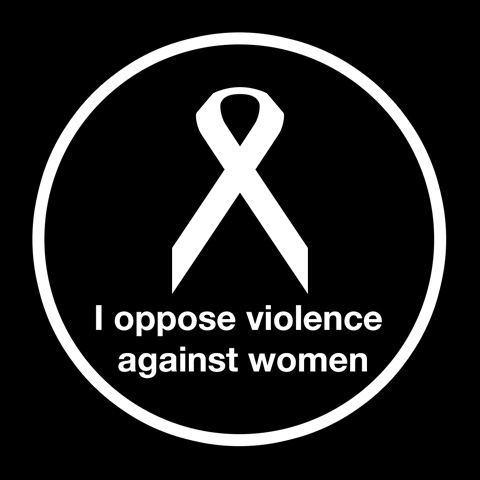 Prominent male leaders in Singapore will don white ribbons this week as part of the White Ribbon campaign, a global movement which unites men and boys to end violence against women and girls.
Prominent male leaders in Singapore will don white ribbons this week as part of the White Ribbon campaign, a global movement which unites men and boys to end violence against women and girls.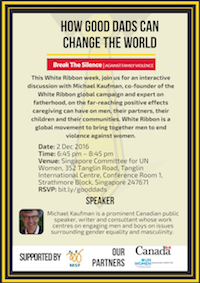 Caregiving transforms men in innumerable positive ways. As men do more of the caregiving, violence against women falls. Delinquency declines. The health, happiness and well-being of men, children and women improve. Couples report better sex lives. Women’s income increases. And domestic conflicts diminish.
Caregiving transforms men in innumerable positive ways. As men do more of the caregiving, violence against women falls. Delinquency declines. The health, happiness and well-being of men, children and women improve. Couples report better sex lives. Women’s income increases. And domestic conflicts diminish.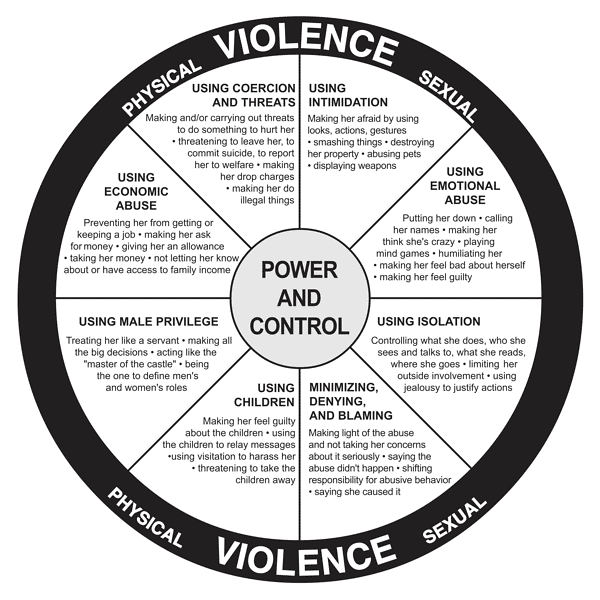 The following is an open letter originally sent to a Bridal Bootcamp event and a speaker who was running a class. A video of the teachings in the class recently went viral, with content that disturbingly communicated domestic violence and illegal confinement.
The following is an open letter originally sent to a Bridal Bootcamp event and a speaker who was running a class. A video of the teachings in the class recently went viral, with content that disturbingly communicated domestic violence and illegal confinement. 
 Here is a compiled and updated list of questions raised in Parliament that are related to AWARE’s work, or are of concern to our organisation.
Here is a compiled and updated list of questions raised in Parliament that are related to AWARE’s work, or are of concern to our organisation.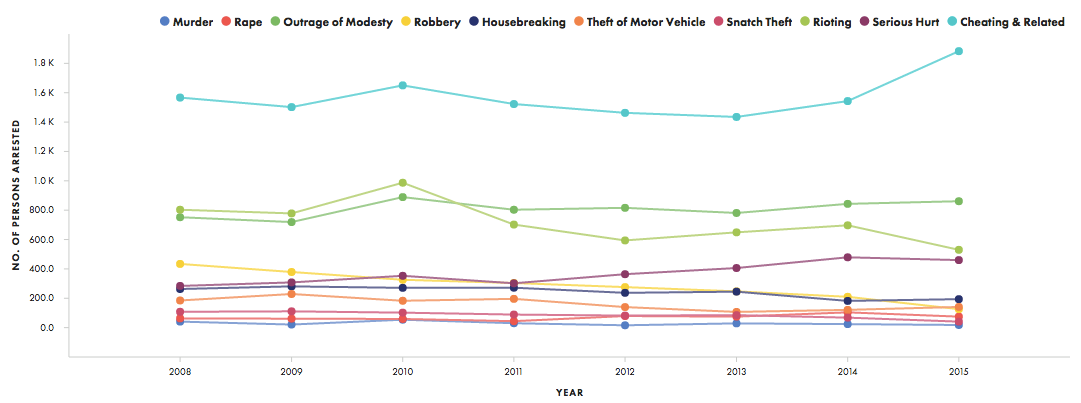
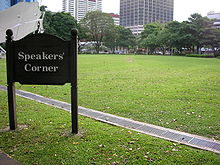 The latest changes to conditions for Speaker’s Corner events and indoor assemblies suggest a troubling closing off to different perspectives (“Keeping domestic issues for locals”, 1 Nov).
The latest changes to conditions for Speaker’s Corner events and indoor assemblies suggest a troubling closing off to different perspectives (“Keeping domestic issues for locals”, 1 Nov). Function 8 is hosting the annual Freedom Film Festival on 19 and 20 November! Happening at The Projector, AWARE’s research executive, Chong Ning Qian, will be speaking at two film discussions – Unsilent Potato and Pertanyaan Untuk Bapak (A Question for my Father) – both dealing with the topic of sexual assault and rape.
Function 8 is hosting the annual Freedom Film Festival on 19 and 20 November! Happening at The Projector, AWARE’s research executive, Chong Ning Qian, will be speaking at two film discussions – Unsilent Potato and Pertanyaan Untuk Bapak (A Question for my Father) – both dealing with the topic of sexual assault and rape.  We have been reviewing our policies on membership and gender to study whether men should be allowed to vote and to serve on the Board.
We have been reviewing our policies on membership and gender to study whether men should be allowed to vote and to serve on the Board.